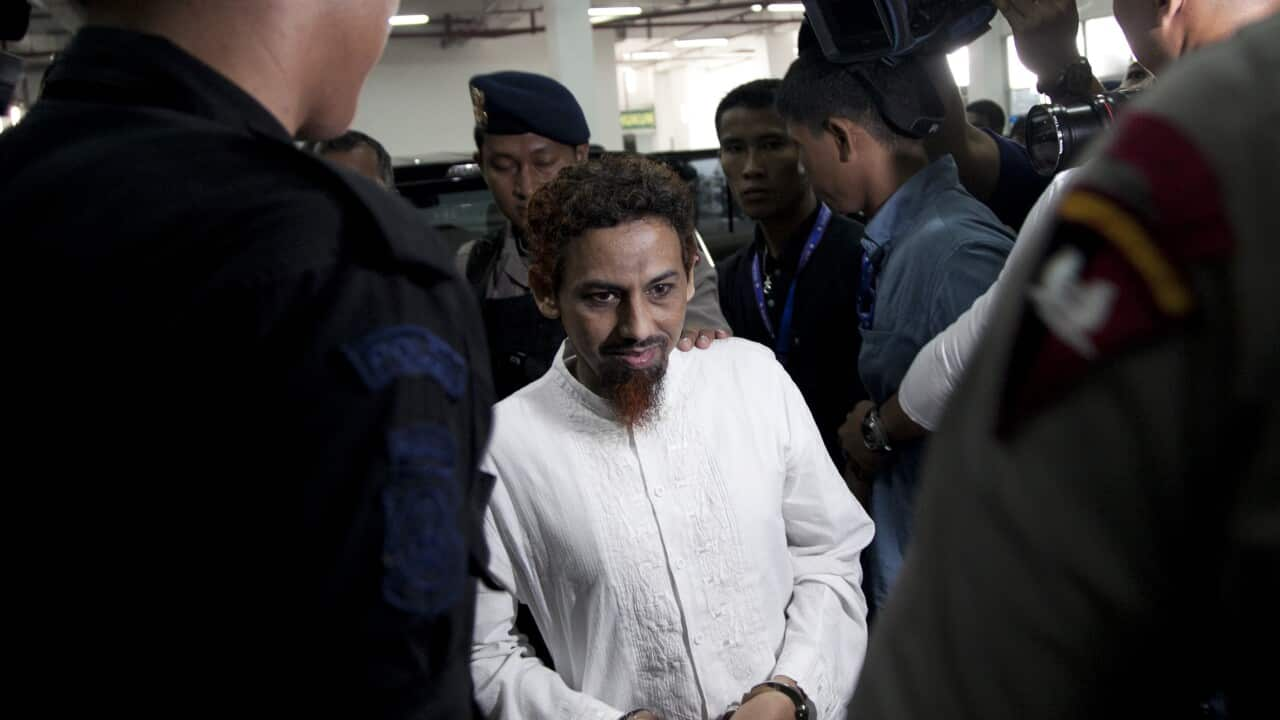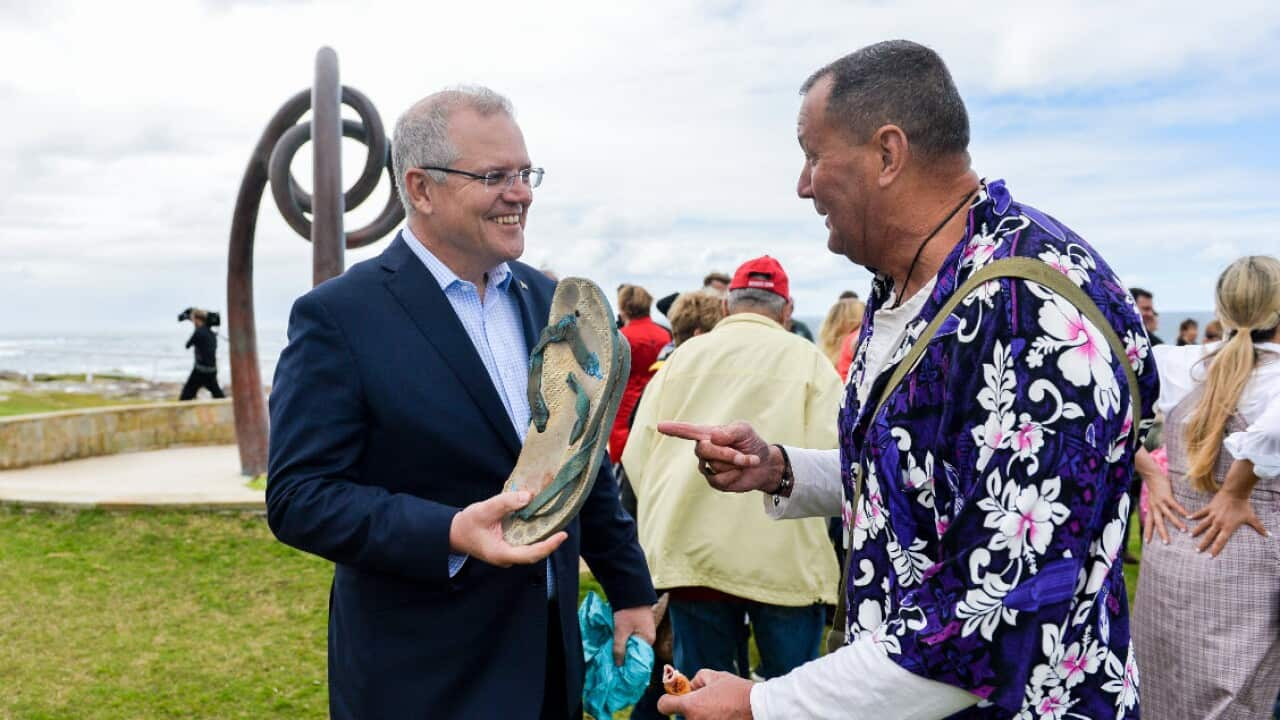Bali bomb maker Umar Patek claims he’s been rehabilitated - what is de-radicalisation and does it work?
- Experts say in order to deter future offending deradicalisation programs must focus on individuals and what led them to become radicalised.
- After serving about half of a 20-year prison sentence for his role in the Bali bombings, and now awaiting parole.
After serving about half of a 20-year prison sentence for his role in the Bali bombings, and now awaiting parole, Indonesian man Umar Patek has claimed he has been deradicalised.
He was part of the Al Qaeda-linked radical Islamist group Jemaah Islamiah in 2002, when its members detonated three bombs, killing 202 people.
Patek was convicted of murder and bomb-making in 2012 for his role in the attack.
In a since-deleted video posted recently to Porong Prison’s YouTube channel, Patek claimed he wanted to deter radicalisation in others once released.

Of the 202 people who died in the bombings, 88 were Australian. Source: AAP / Made Nagi
But is it possible for someone convicted of such crimes to change?
The path to radicalisation
Many people who become radicalised felt they were part of a community that was in some sort of decline, says Curtin University Extremism Research Network co-director Ben Rich.
“They feel the normal means of politics — the democratic means that we accept are a healthy part of a liberal democracy; political protest, engagement in that kind of market of ideas — they’re no longer seen as a legitimate means of achieving their political goals,” Dr Rich said.
“They start to view extremist behaviour and even some cases violent behaviour as a legitimate means by which they can redress those grievances and concerns.”
Dr Rich said these people often seek out a community where their grievances are reinforced.
“They find a way that their ideas are massaged, developed, and legitimated.”
Dr Clarke Jones, senior research fellow at the Research School of Psychology at the Australian National University said while radicalisation was often conflated with someone’s beliefs, it was not always the only driver.
He said there were often a number of contributing factors.
As a consultant with United Nations Office of Drugs and Crime, much of his work is done in the Philippines, where he said a lot of the drivers of people turning to violent extremism are socio-economic.
“I once interviewed a 17 year old offender after the Marawi siege, in the Philippines, and he simply joined terrorism, because it paid more than rice farming,” he said.

Ben Rich, senior lecturer in international relations and history and co-director of Curtin University’s Extremism Research Network.
How marriage can reverse radicalisation
Dr Rich said there were a number of methods used to attempt to deradicalise people who have committed terrorist acts.
He said an individualised approach was most likely to create change.
“Often, what we see with people who become radicalised, they're very alienated within their own societies, and as a result of that, this kind of structural approach is more about giving them a sense that they have some kind of a stake in the society itself and that violence is not a legitimate means of addressing those concerns,” Dr Rich said.
“This can be in very basic ways, for instance, getting them involved with sporting clubs, getting them jobs or training,” he said.
“In places like Saudi Arabia, one case was about actually getting them married, because this idea that, if you're married, and you have a family, it's going to be a lot harder for you to rationalise going off and engaging in an act of terror.”
Another method is challenging a person’s ideas in an effort to influence their ways of thinking.
“Dealing with violent Islamic extremists, there’s been an attempt in the past, not necessarily particularly successful though, to bring in an Islamic Imam, and basically engage with them on their interpretation of Islam,” Dr Rich said.
Why it's never 100 per cent effective
Given the field of countering violent extremism is a relatively new one, there are no large-scale studies which provide quantifiable rates of success.
Dr Jones said it was possible to reduce the chances of someone committing a violent crime again in the future.

Dr Clarke Jones, senior research fellow at the Research School of Psychology at the Australian National University. Source: Supplied
"So when people say, 'Does deradicalisation work?' for example, it's never 100 per cent," he said.
The likelihood of reducing offending could be increased with the inclusion of supportive families in the rehabilitation process and by operating programs that offenders can see benefit in themselves, Dr Rich said.
In some cases deradicalisation programs may not completely change the way a person thinks, more often it's able to help people decide not to act upon such thoughts with violence.
“There’s plenty of case studies of people who embraced violence, who may have even held on to their extremist beliefs, but came to view violence as not necessarily the means of achieving those beliefs,” he said.
'It could be part of an act'
Patek’s prison sentence has been gradually reduced due to remissions granted as part of the Indonesian justice system, and he became eligible for parole in August.
The exact date of his release, the final sign-off for which rests with Indonesia's justice minister, remains unclear.
, who survived the bombings but lost six friends in the terrorist attack, feels regardless of whether Patek has been de-radicalised or not, he felt no sense of justice.
"I don't care if he's been deradicalised or not, it could be part of an act," he said.
"At the end of the day he made a weapon that killed 200 people and doesn't deserve to be given a good behaviour release."
The threat in Australia
Dr Rich said while the religious extremism that fuelled those behind the Bali bombings has not disappeared, jihadist movements had seen a change of focus.
“There are groups that are basically saying, we can operate and achieve our goals locally, without necessarily, you know, locking horns with the West," he said.
Dr Rich said in Western countries including Australia, the terrorism threat was from right-wing extremism.
He said work to counter home-grown violent extremism within communities was vital.
“A lot of people who ultimately become violent extremists, you can often identify particular moments in their lives, particular hinge points where, if they'd had a community around them, if they'd had a group of friends, if they had family more interest in what they were doing, they very well might have been steered away from that outcome,” Dr Rich said.
In Australia, work to intervene before individuals turn to violence is done on a state-by-state basis, supported by federal funding.
“Historically, it may have been a bit starved of resources. But there is an increasing awareness of how important this kind of thing is,” Dr Rich said.
He said there were referral programs where people seen to be at risk of engaging in violent extremism can be referred to, and if they consent to take part, take an individualised approach to look at the factors affecting their everyday life.
“In one case I’m aware of, there was an individual who didn't have a driver's license. So what they decided to do was try and get them that driver's license, because that would then allow them to get a job and then get them those social ties,” Dr Rich said.
“It's a bit sad sometimes that we have to engage in these types of activities because of the fear of the threat of terrorism, rather than broader social problems.”




